- News
- Reviews
- Bikes
- Accessories
- Accessories - misc
- Computer mounts
- Bags
- Bar ends
- Bike bags & cases
- Bottle cages
- Bottles
- Cameras
- Car racks
- Child seats
- Computers
- Glasses
- GPS units
- Helmets
- Lights - front
- Lights - rear
- Lights - sets
- Locks
- Mirrors
- Mudguards
- Racks
- Pumps & CO2 inflators
- Puncture kits
- Reflectives
- Smart watches
- Stands and racks
- Trailers
- Clothing
- Components
- Bar tape & grips
- Bottom brackets
- Brake & gear cables
- Brake & STI levers
- Brake pads & spares
- Brakes
- Cassettes & freewheels
- Chains
- Chainsets & chainrings
- Derailleurs - front
- Derailleurs - rear
- Forks
- Gear levers & shifters
- Groupsets
- Handlebars & extensions
- Headsets
- Hubs
- Inner tubes
- Pedals
- Quick releases & skewers
- Saddles
- Seatposts
- Stems
- Wheels
- Tyres
- Health, fitness and nutrition
- Tools and workshop
- Miscellaneous
- Tubeless valves
- Buyers Guides
- Features
- Forum
- Recommends
- Podcast
feature
 UCI Men's eSports Championship (TLBVelo photography @ TLBVelo.com)
UCI Men's eSports Championship (TLBVelo photography @ TLBVelo.com)Is Zwift racing 'cleaner' than pro road racing? Dissecting the furore around cheating in virtual cycling
Zwift needs a do-over. Rewind to the beta days and a bit after and start again. In the mid-2010s, there weren't any Zwift-sanctioned races. One bike is a ride, two are a race, and Zwifters were not immune to the irresistible lure of competition.
The underground virtual races started as a word-of-mouth gentlemen's agreement to meet at a particular place at a specific time on rebel routes, and it was on. There was little organisation and no regulation. It was the wild west, and Zwift actually wanted little to do with it in the beginning.
Cheating was rampant and continued unchecked despite cries from the vocal minority of racers on the platform to reel it in. The racing infrastructure improved organically through community-driven involvement, races became more organised, and Zwift half-heartedly succumbed to the mass effect.
> Everything you need to know to try racing in Zwift
As recently as late 2021, Zwift's head of PR, Chris Snook, explained the platform's position on racing, saying that Zwift as a platform is not competitive esports-focused, and that the majority use the platform solely as a training aid. 80% will explore and free ride, 50% will train or complete a workout, and only 20% will compete. That stance has now changed, and for the better.
The evolution of underground virtual racing into esports
Zwift racing evolved to esports, but that cheating stigma remains. Traditional cyclists snub their noses at online racers because they all cheat, so we're told. Zwift e-racers know the blanket statement comes from a place of ignorance; the same is said about traditional road racing by casual outsiders looking in.
Zwift takes racing very seriously now and is fiercely protective of its elite-level competition asset. There is a significant philosophy shift towards embracing competition, and Zwift appears to have backed it up with resources, effort and innovation.
To Zwift racers, the constant talk of foul play is low-hanging fruit worthy of eye-rolls, like when an uneducated naysayer mentions a certain Texan cyclist every time one of the world's most finely-tuned athletes does something remarkable.
Is it fair and justified? Not exactly, according to Snook, talking about the recently banned Eddy Hoole who was caught hacking data during a UCI eSports World Championships qualifier, putting in a seemingly other-worldly performance last month:
"He would have eventually been caught, but this instance was so far in the extreme that the question wasn’t if he was cheating," says Snook.
"All we needed to do at that point was figure out how."
The incident and its repercussions were covered extensively in cycling media, as is the case whenever there's virtual cycling fruit to pick. DC Rainmaker was the first to press with a detailed account and hack theory earlier in December, deftly outlining the banned rider's offence. It attributed it to a well-known hack vector revealed in 2019, stating: "Now, not only are people using it, but someone that had won an automatic ticket to the UCI World Championships used it."
Not so, says Snook.
"Yes, it’s something Zwift’s aware of and monitored for quite some time," he says.
"Zwift has plans and measures to intercept and prevent this from happening. We can’t go into detail about how we observe it because it helps give information to potential cheaters. We don’t want to tell how we make the sausage because it provides information to discover new cheating methods."
Snook wouldn't go into the details, but did explain why it wasn't detected sooner:
"This wasn’t a [cycling tech Youtuber] Keith Wakeham man-in-the-middle hack or one like the other that was exposed. There are multiple ways to hack servers, intercept signals, and manipulate them before they hit Zwift servers or block one signal and send another.
"Ray [DC Rainmaker] latched on to the Keith Wakeham hack because he ran a piece on it in 2019, but it is not that hack."
Review: Zwift Monthly Subscription
Like with doping in the pro peloton, the World Anti-Doping Agency (WADA) always has to play catch-up. There’s unlimited potential to create new drugs, use them in an undetectable manner, or mask them, and the cheaters are one step ahead. WADA is constantly finding new testing methods to keep up with the changes and cheating methodology. When the tests are successful, they become a part of the procedures.
Zwift racing distinguishes itself in key ways
Zwift, and its own Zwift Anti-Doping Agency (ZADA) are no different, except for a few key points that distinguish esports, says Snook.
"ZADA's advantage over WADA is that we can retrospectively examine unlimited historical data infinitely. It’s all saved on Zwift servers, and there’s no hiding from that data. A Zwift racer can’t erase what they’ve done.
"A rider outdoors in real life that is doping but isn’t tested can continue to cheat, and there’ll be no record. The racer has gotten away with it, and there’s no way back."
Zwift is currently sifting through the past data of riders currently on its radar; a watch list, so to speak.
ZADA handles all testing, verification, validation, and investigation of elite-level Zwift racing, and Zwift’s Cycling Esports Commission Chair Dr. George Gilbert oversees the findings. ZADA is an independent contractor financed by Zwift and, therefore, ideally free of employee bias.
Dr. Gilbert signs off on all ZADA findings and decisions. If ZADA makes a judgement, he determines what sanction and brings the information to Zwift for enforcement.
Zwift then has policies in place to question the verdict. For instance, will the decision stand up in court? There is an appeals process in place that riders have the right to take advantage of, and Zwift holds the burden of presenting a solid case.
The appeal goes to an independent verification board. Zwift is careful to ensure that its decision will stand up if challenged and takes every step to do so, confirms Snook: "That is key because many people can have suspicions about riders. There is a difference between suspicion and proof. We have the burden of hard evidence and to present without-a-doubt proof that a rider one did cheat and two, deliberately cheated."
The UCI doesn’t have its own form of ZADA, because it relies on Zwift; however, it brings anti-doping controls and the whereabouts programme to the World Championships, creating a hybrid model. The stringent anti-doping protocols and credibility are why Zwift partnered with the UCI.
Penalties and Protocols
According to Snook, it adds additional complexity to the decision-making process regarding penalties and the perception of leniency in the case of Hoole.
"The tiered system is in place and includes one, two-year, and lifetime bans," he says.
"Pro cycling doesn’t have automatic lifetime bans on doping violations. There’s no reason Zwift would do that.
"The sport is in its infancy, these are community racers and they aren’t professional athletes, but they are elite. Some are sponsored and might get prize money, but it's not their livelihood. We have to be mindful of that."
The grim reality is that when a Zwift racer receives a ban, it's effectively a life sentence. They don't return because the community reaction is harsh, and few teams are willing to take on a convicted rider.
Zwift looks to its teams to help prevent cheating and ethics violations. Snook says it is a criterion for an invitation to compete at the sport's highest level, The Zwift Grand Prix.
"We wanted teams with the best processes in place—they all sign rules and regulations and codes of conduct. Enforcement is at the individual discretion of the teams. They sign an authorisation before the league begins.
"The teams have their own standards. When Toyota Cryo RDT heard about Eddy, they dropped him from the team."
In addition, within the Esports commission, the race committees and the team managers can share suspicions and complaints. Anything raised must be investigated, including allegations against a racer or a team, and ZADA examines that retrospectively.
Digital Passport
Zwift's performance verification is another crucial distinguishing component. Its performance team creates a digital electronic passport for every elite-level rider, says Snook:
"We know precisely what each rider is capable of, their heart rate averages, how they’re progressing in their fitness, how they recover between intervals, the equipment they use, and their typical cadence. We have a helluva lot of data on these riders.
"We do have a digital passport for each of the riders. We have far more information on each rider than in traditional sports and bio passports."
Zwift doesn't only have the data from elite-level esports competitions, but all the rider's data from training, community racing on the platform and outdoor data. Zwift compares a rider's indoor and outdoor performance, as well. Zwift records data parameters for each rider and compares them to what a human is physiologically capable of doing.
So, is Zwift racing really fairer than pro road racing?
While readers will of course draw their own conclusions to answer this question, Zwift appears to be trying to do all it can to legitimise esports and forge a path to create a unique cycling discipline. Snook closes by pointing out the positives in a challenging situation for esports and Zwift:
"We firmly believe that Zwift racing is far cleaner than real-life traditional outdoor racing. We have all the data and information on the riders, the ability to investigate and look back at data retrospectively, and the individual digital passports.
"The only positive you can take out of one of these banning issues is that it shows the system works.
"The easy thing for Zwift to do is not disclose information or even issue bans. We do it because we firmly believe it is the right thing for the sport and the only way to legitimise it as a unique discipline.
"We want to follow established procedures in disclosure, like WADA in traditional racing, and be transparent and open in public disclosure and allow the appeals process to take its course.
"It’s the only positive. It does work. We do take it seriously, and we must be a legitimate sport. It’s important too because it wouldn't be fun if it weren’t fair."
Fair is Fun. That has a nice ring to it...
A physical therapist with over 25 years of experience, Christopher Schwenker is on a journey to give back to the cycling community for rewarding experiences and fulfilling relationships through the pages of his virtual cycling blog, The Zommunique.com. He rode his bike across the US in 2022 to raise awareness of his cycling-related non-profit, The DIRT Dad Fund.
Latest Comments
- Will Ive Hook 4 hours 26 sec ago
I got a pair for fifty quid a few weeks ago and they are a gorgeeous fit. If I'd paid £210, they'd still be in the box. I sized down from extra...
- PoorInRichfield 4 hours 32 min ago
While they're at it, why not combine 105 and Ultegra into a single group set?...
- Sredlums 5 hours 6 min ago
Exactly what I was wondering. How do you KNOW how much it deviates. What kind of setup is used, what devices are used, and does that accurately...
- mikeclarke 6 hours 8 min ago
Think those roads are bad? Have a look at the road between Northwood and Bettisfield. All the minor roads on the Shropshire Wales border are in a...
- Malv173 7 hours 20 min ago
You a Sun writer? Rabid tribalism wasn't responsible for the Hillsborough disaster. Poor policing and management of the crowds, including stadium...
- belugabob 7 hours 38 min ago
If you take a look at Google maps street view, from the Bush lane end, you'll see that there already seems to be hedges, either side of what looks...
- ktache 8 hours 17 min ago
Bonus for buses and lorries hitting bridges?
- roboito 9 hours 6 min ago
I had this on my Forerunner 955 yesterday, needed a hard reset. The instructions were on the Garmin website. A time wasting annoyance but easily...
- Rendel Harris 9 hours 33 min ago
I dunno, they complain that they spend all this money on cycle lanes and nobody uses them and then one does and...
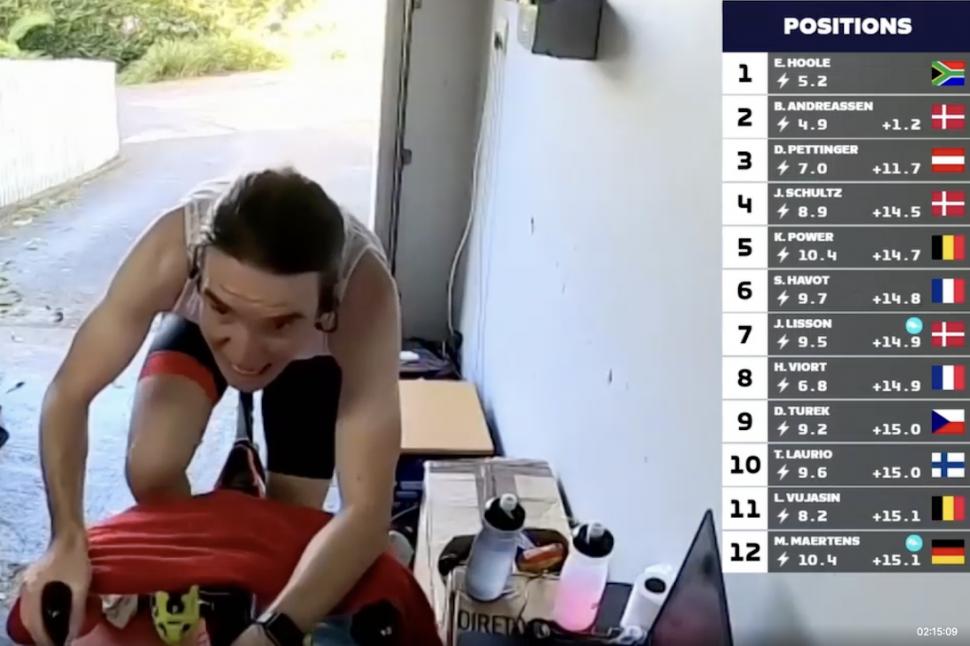
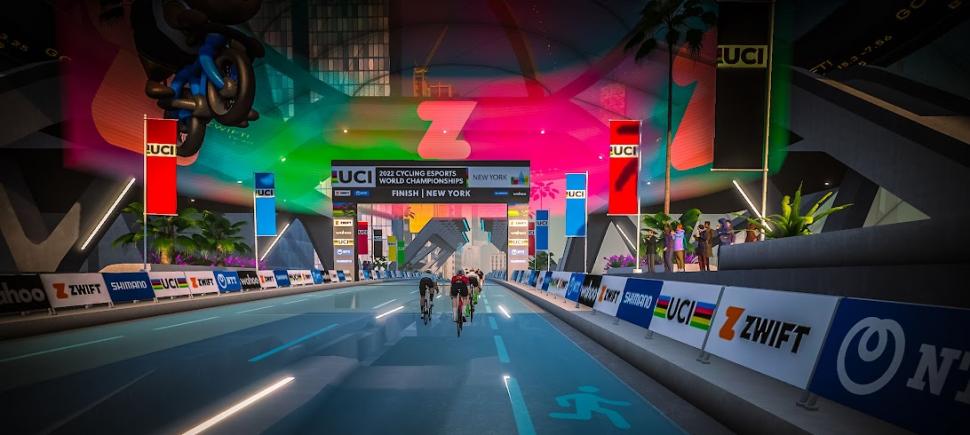
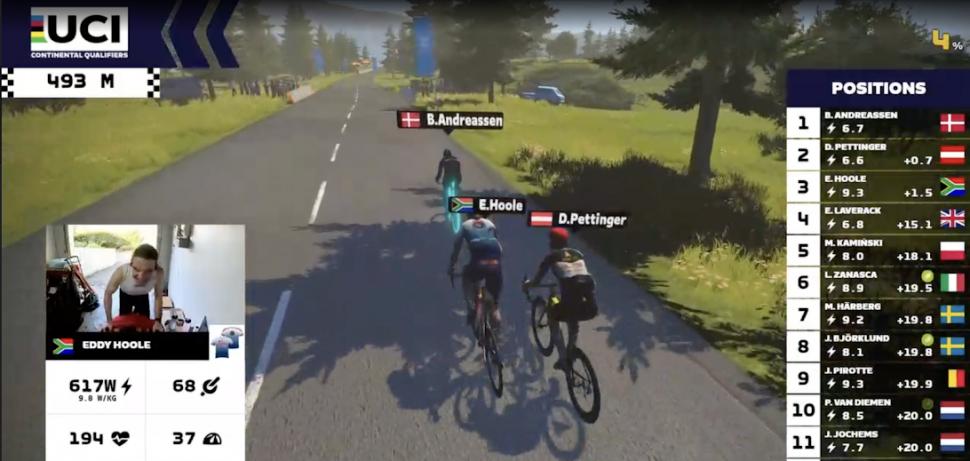

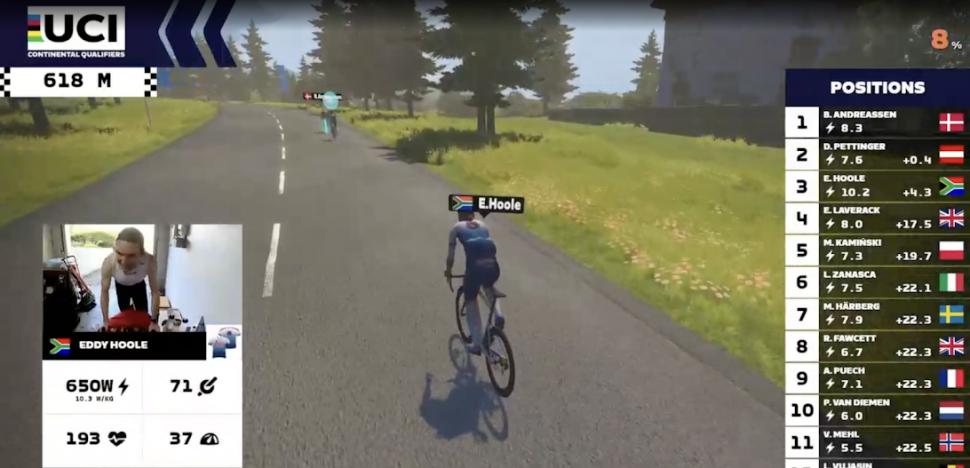
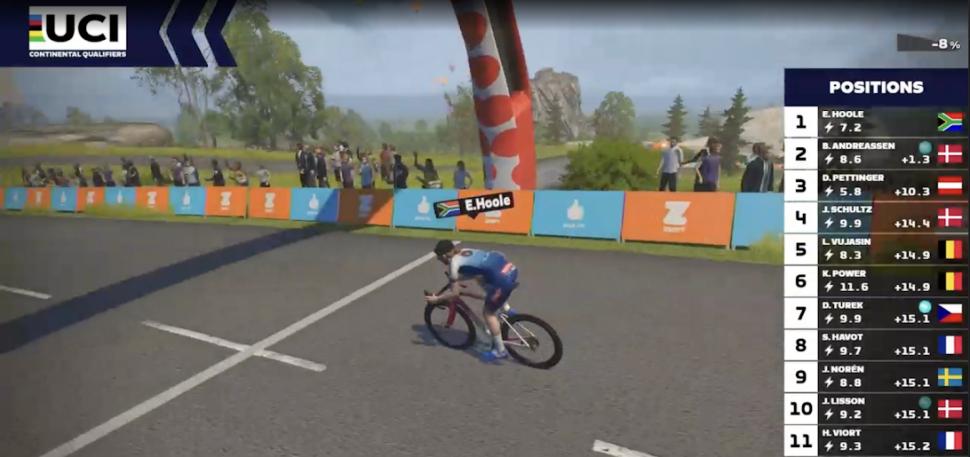
Add new comment
12 comments
First time I used a rowing machine I easily did 10km. Pretty sure real world rowing would be tougher haha. Bike trainer is same. Ie fake.
Depends on if you're rowing up or downhill
It's not just on Zwift though.Fulgaz is just as bad.You have riders who can't climb at 8-10 mph in real life yet hit over 20 mph on there. One guy did 39 Mph up Honister.Strava reckon it's a genuine ride.You have to laugh at these sad people.A guy puts "TT position and settings" on his rides on a turbo trainer . He climbed faster than the pros on Col du Joux Plane and numerous other climbs and he's in his 50s.He also claims to be a TT specialist.Yet he only ever rode one TT in real life finishing 4th last @ 19mph.I wonder what the "Panzer Wagon,and Spartacus thought about that
. He climbed faster than the pros on Col du Joux Plane and numerous other climbs and he's in his 50s.He also claims to be a TT specialist.Yet he only ever rode one TT in real life finishing 4th last @ 19mph.I wonder what the "Panzer Wagon,and Spartacus thought about that  check him out he goes by N GB on strava.
check him out he goes by N GB on strava.
Then there's a guy from Ellington,Northumberland on Zwift who's weight is under 12 stone.
In real life he's between 15stone 7lb and 16 stone YCMIU.WHY do that? If you think that you're fast then pin a number on your back and have a go for real.They should rename Strava to Bragva
People are taking this far too seriously; it's a training tool......
It is, but it has transcended just 'training'. People love the gaming aspect of it, and of course with greater popularity comes sponsorship, and money, increasing the incentive to cheat.
Looking at the numbers produced by Zwift racers at even very modest levels, I suspect 'cheating' is endemic, either that or there are a lot of world class athletes that have never left their garages.
Yes. I fully recognise that I am rubbish, but the ease with which I'm dropped every time by riders with categories/stats similar to mine has put me off racing more regularly.
Some of it is deliberate sandbagging: it's picked up in the results later but still spoils the race. Some of it is unintentional: why would a casual indoor-only rider know that their power meter is 10% or more out if they don't ride with power measurements IRL?
Some though is encouraged by the design: heavier riders are disproportionately advantaged on the flats, and the ability to "iron out" hills with the trainer difficulty setting means climbers (which I'm not) don't get to benefit. I'd like to see at least some races with an enforced trainer difficulty, as it's so dispiriting hitting a climb and seeing the rest of the bunch steaming off without even a drop in cadence.
We need to bear in mind that the only guaranteed way to catch an electronic cheater is have them in the room with totally standard and verified kit. Once you are remote the opportunities for cheating increase significantly.
So based on that with a lot of the top tier events being in person, it's gonna be the mid tier that suffers more.
Having said that - it remains to be seen how a big a problem it actually is.
Thank you for the thoughtful comment, Squirrel. The report is based on the best practices utilized for elite-level events. Zwift is open in stating that the same standard isn't upheld at the community level. Unfortunately, I'm not aware of any initiative to prioritize live events. Interestingly, many of the elite racers I've interviewed would welcome it. However, all racers competing in the World Championships are supplied with certified equipment.
That is slightly true, but there are cheaters getting to those chances where you are all on the same due to their equipment hacks. I know of at least 1 person, who has been to a final, served an e-ban and still continues to use a disingenuous power meter.
I also outlined to Zwift back in 2018 as "e-nationals" were starting to become a thing, how I could manipulate data that passed ZwiftPower at the time. They just shrugged their shoulders at it. As with everything, when money is involved, some things get overlooked and swept aside. That's why, as hard as i try, there doesn't seem to be a public list of past and present suspensions from e-doping available.
Reading the details of the Eddy Hoole case it suggests they are a long, long way behind in identifying cheaters, the only reason it appears he was caught was because he carried out an impossible sprint. It appears he'd been cheating for some time with that ridiculous 25% increase in power due to the pattern of disconnects at the start of races yet he'd avoided detection which makes me wonder how many other riders are using similar techniques to cheat but a more subtle boost in power.
To be fair to Zwift I think it's a problem with the whole system and that with the data being broadcast openly, it's wide open for hacks and cheating until work is done to enforce secure communications that can't be tampered with. They'll never stop cheating entirely but they can certainly reduce it and hopefully in this case as with video game cheating scandals it will help them identify more cheaters using the same technique.
Personally as a non-pro rider I'm not bothered about people cheating on Zwift races, I'm not good at Zwift racing but I find it fun and find it beneficial as it pushes me extremely hard.
I appreciate your perspective, John. Zwift and many members of the elite racing community suspect the cheating may have been ongoing. Although, now that the hack has been detected, Zwift contends they will investigate rider files retroactively to uncover any other riders cheating similarly. In addition, this particular method will be added to routine detection, theoretically making it more robust. Unfortunately, much like in traditional road racing and Olympic sport, cheating and doping are facts. However, I walked away from the interview with Zwift that they take it seriously and back anti-cheating with significant resources. Cheers and happy holidays.